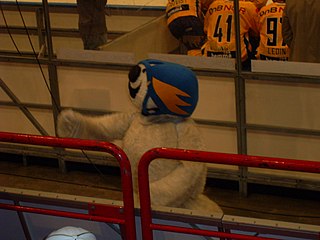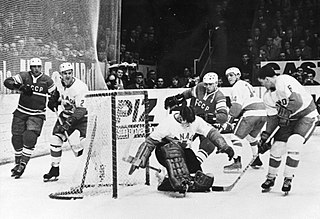
The Ice Hockey World Championships are an annual international men's ice hockey tournament organized by the International Ice Hockey Federation (IIHF). First officially held at the 1920 Summer Olympics, it is the sport's highest profile annual international tournament. The IIHF was created in 1908 while the European Championships, the precursor to the World Championships, were first held in 1910. The tournament held at the 1920 Summer Olympics is recognized as the first Ice Hockey World Championship. From 1920 to 1968, the Olympic hockey tournament was also considered the World Championship for that year.

The men's ice hockey tournament at the 1988 Winter Olympics in Calgary, Alberta, Canada, was the 16th Olympic Championship. The Soviet Union won its seventh gold medal. The silver medal was won by Finland, marking its first ever Olympic ice hockey medal. Sweden won the bronze medal. Games were held in the Olympic Saddledome, the Stampede Corral, and Father David Bauer Olympic Arena. This is so far the only Olympic tournament held on North American soil that was not won by either Canada or United States.
The men's ice hockey tournament at the 1980 Winter Olympics in Lake Placid, United States, was the 14th Olympic Championship. Twelve teams competed in the tournament, which was held from February 12 to 24, 1980. The United States won its second gold medal, including a win over the heavily favored Soviet Union that became known as the "Miracle on Ice".Games were held at the Olympic Fieldhouse (8,000) and the Olympic Arena (2,500).

The 1987 World Junior Ice Hockey Championships was the 11th edition of the Ice Hockey World Junior Championship and was held in Piešťany, Trenčín, Nitra, and Topoľčany, Czechoslovakia. Finland captured its first World Junior gold medal, Czechoslovakia took silver, and Sweden the bronze. The tournament is most remembered, however, for how the medals were allocated.

The 1995 Men's Ice Hockey World Championships was the 59th such event sanctioned by the International Ice Hockey Federation (IIHF). Teams representing 39 countries participated in several levels of competition. The competition also served as qualifications for group placements in the 1996 competition.
The 1996 Men's Ice Hockey World Championships was the 60th such event sanctioned by the International Ice Hockey Federation (IIHF). Teams representing 36 countries participated in several levels of competition, with Slovakia making their first appearance in the top Champions Group A, in their fourth tournament since the dissolution of Czechoslovakia and the formation of the separate Czech Republic and Slovakia men's national ice hockey teams. The competition also served as qualifications for group placements in the 1997 competition.

The 1991 Men's Ice Hockey World Championships was the 55th such event sanctioned by the International Ice Hockey Federation (IIHF), and at the same time served as the 66th and last Ice Hockey European Championships. Teams representing 25 countries participated in several levels of competition. The competition also served as qualifications for group placements in the 1992 competition.
The 1987 Ice Hockey World Championships was the 52nd such event hosted by the International Ice Hockey Federation. It was also the 63rd European Championships. Teams representing 28 countries participated in four levels of competition.

The 1986 Ice Hockey World Championships took place in the Soviet Union from 12 to 28 April. The games were played at the Luzhniki Palace of Sports and the CSKA Ice Palace in Moscow, and eight teams took part. Each team played each other once, and then The four best teams then played each other once more with no results carrying over, and the other four teams played each other again to determine ranking and relegation. This was the 51st World Championships, and also the 62nd ice hockey European Championships. The reigning world champions from Czechoslovakia finished fifth, and the Soviet Union became World Champions for the twentieth time, and also won their 24th European Championship. In the European Championship, only mutual games between European teams in the first round were counted. For the disappointing Czechoslovaks, this was the first time since 1967 that they had finished out of the medals, and their worst result outside the Olympics since 1937.

The 1985 Ice Hockey World Championships took place in Prague, Czechoslovakia from 17 April to 3 May. Eight teams took part, with each team playing each other once. The four best teams then played each other once more with no results carrying over, and the other four teams played each other again to determine ranking and relegation. This was the 50th World Championships, and also the 61st European Championships of ice hockey. The home side, Czechoslovakia, became world champions for the 6th time, and the Soviet Union won their 23rd European title. For the European Championship, only games between European sides in the first round are included.
The 1982 Ice Hockey World Championships took place in Finland from the 15 April to the 29 April. The games were played in Helsinki and Tampere with eight teams playing a single round-robin, followed by the top four teams playing each other once more. This was the 48th World Championships, and also the 59th European Championships of ice hockey. The Soviet Union became World Champions for the 18th time, and also won their 21st European Championship.
The 1978 Ice Hockey World Championships took place in Prague, Czechoslovakia from 26 April to 14 May. Eight teams took part, with each team playing each other once in the first round, and then the four best teams meeting in a new round. This was the 45th World Championships, and also the 56th European Championships. The USSR won for the fifteenth time, narrowly defeating the incumbent Czechoslovaks.
The 1976 Ice Hockey World Championships were the 43rd Ice Hockey World Championships and the 54th European Championships in ice hockey. The tournament took place in Poland from 8 to 25 April, and the games were played in Katowice. Eight teams took part in the main tournament, with each team first playing each other once. The four best teams then took part in a medal play off, and the teams placed 5–8 took part in a relegation play-off. The teams took the results from the first round through to the second round with them.
The 1985 World Junior Ice Hockey Championships was the ninth edition of the Ice Hockey World Junior Championship and was held mainly in Turku and Helsinki, Finland. Canada won the gold medal, its second championship, Czechoslovakia silver and the Soviet Union bronze.

The 1967 Ice Hockey World Championships was the 34th edition of the Ice Hockey World Championships. The tournament was held in Vienna, Austria from March 18 to March 29, 1967. The Soviet Union won the tournament for the fifth straight year, Sweden won the silver medal, and Canada claimed the bronze medal.

The 1966 Ice Hockey World Championships was the 33rd edition of the Ice Hockey World Championships. The tournament was held in Hala Tivoli, Ljubljana, SR Slovenia, SFR Yugoslavia from 3 to 14 March 1966. For the fourth straight year, the Soviet Union won the tournament. For the Soviets, it was their sixth World and tenth European title. Czechoslovakia beat both Canada and Sweden two to one, to take the Silver, while the Swedes' historic loss to East Germany helped put them fourth behind Canada for the Bronze.
The 1976 IIHF European U19 Championship was the ninth playing of the IIHF European Junior Championships.
The 1991 IIHF European U18 Championship was the twenty-fourth playing of the IIHF European Junior Championships. The Soviets, playing for the last time as a unified nation, placed 2nd, and the Germans, playing for the first time as a unified nation, placed 5th.
The 1996 IIHF European U18 Championship was the twenty-ninth playing of the IIHF European Junior Championships.

The 2013 IIHF World U20 Championship was the 37th edition of the Ice Hockey World Junior Championship (WJC). It was hosted in Ufa, Russia. It began on December 26, 2012, and ended with the gold medal game played on January 5, 2013. The United States defeated defending-champion Sweden 3–1 to win their third title, their first one since 2010. American goalie John Gibson was named MVP of the tournament.









